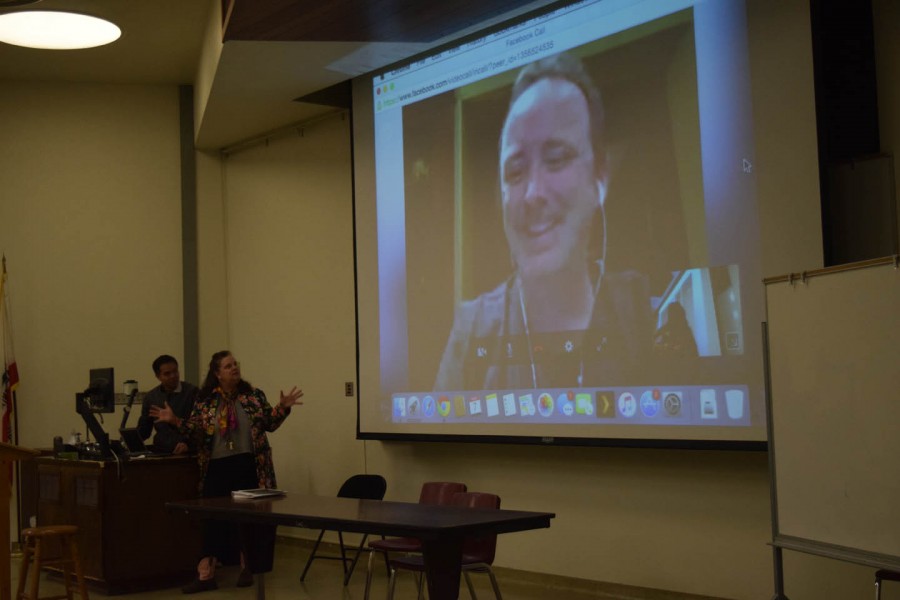Film targets sexual assault
March 15, 2016
Elizabeth Rodacker, professor at Bakersfield College, presented a film March 7 called “The Hunting Ground” in celebration of Women’s History month.
The film is about women and some men who were raped on university campuses and tried to seek help from their respective university presidents. As they kept talking with their deans, they found that the deans tried to discourage them from reporting.
When the women tried to report the rape, they found no support from their schools or law enforcement. After the film was over, Rodacker opened the room for discussion with the producer Doug Blush, who entered the discussion on Skype.
One student asked: “Is there a law that can stop them and should I fear for my own daughter, who goes to BC, when she transfers to a university?”
Blush replied, “There’s always been a law and that law is Title IX. It applies to all colleges across the entire United States and allows you to take this to an authority, usually on campus. There’s what’s called a Title IX coordinator. Some campuses don’t have one of these and they should, but the federal government can be brought in.”
Another student asked, “Why produce this film?”
Blush, who has a 14-year-old daughter, had done another film, “The Invisible War,” about sexual assault within the military. After the film was produced, laws were passed within the U.S. Government that protected service men and women from sexual assault. After that, people congratulated Blush on the film, but they also sought advice with problems at universities. Some requested Blush make another film based on the problems their sons or daughters were having within their colleges. The military has also incorporated the film into training.
“The Hunting Ground” has played both on and off campuses. There have been private viewings for athletes, and fraternities have showed the film to their pledges.
“The truth is, we want to see a lot more in punishment of people being expelled,” Blush said. One of the big things that needs to get done is removing these people off the campuses, especially the ones who are repeat offenders. They will do it again and again because they know they’ll get away with it. All we ask is for these universities to come clean and to acknowledge these rapes and sexual assaults. Even though these universities don’t want that bad reputation, you should be more afraid of a campus that doesn’t have anything to report, because not one campus has a perfect record. Then it will be up to the administration to stand up and say, ‘Hey, we have a major problem we have to deal with. We’re not going to shy away from it [and we’re] not going to tell people not to report it. Were going to do the right thing.’”
Acriminal justice professor at BC shared her story about being sexually assaulted when she was 19 years old and remaining silent about it for 25 years. She wanted to let everyone know that rape or sexual assault doesn’t just happen on college campuses.
“It can happen at a house, your home, or a relative’s home,” she said. For her, it happened at the doctor’s office.
“I hadn’t realized that from the first visit he was planning to victimize me,” she said. “It was the second visit to his office when he assaulted me.”
Blush thanked the professor for sharing her story. “That’s what it takes to stop this,” he said. “It’s really important for people to share their stories. To tell their stories with other survivors and to go to places where they can share their stories.”
Blush said many assaults are not reported, and when they are reported, the process “is so horrible, especially for the victim. It’s absolutely a nightmare to go through in the current system.”
Conviction rates are low, so many people never go forward with the report.
In order for this to change, Blush says the system needs to encourage men and women to step forward.
But he said when they do, they are asked the wrong questions, such as: What were you wearing? Where was your boyfriend? Was your shirt very small? Did you have a lot of alcohol?
He said what should be asked is: Has the person accused of the assault raped repeatedly? Are there other reports on this person?
Blush said this comes down to educating men more on this topic, and teaching them about consent and what it means to ask for and acquire it.
Blush also said, “The more this film is shown, the more people talk about it. The more you find out about it [sexual assault], the more it will slow down and soon get rid of it.”
When the discussion was over, Rodacker said she had students who came up to her and ask how they could report or learn how to report in case something like this happens.
Rodacker explained that domestic violence is a huge problem in Kern County, which has some of the highest statistics in the state.
“I was kind of shocked at some of the ways that sexual assaults are not punished on campuses,” Rodacker said regarding information the movie presented. “The connection between alcohol, athletics, and violence I always knew that was there, but the film really showed how you tie those three together.”
In the film, some men are shown as victims, but Rodacker estimated the percentage of male victims is small – about 3-4 percent – as compared to female victims.
Rodacker hopes to start a violence prevention committee at BC that will help empower women with not only self-defense classes and films on the topic but also hopes to make the campus a safe community for victims to be able to make a report.






